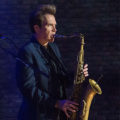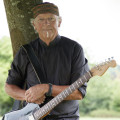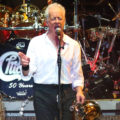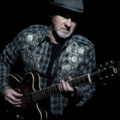Boz Scaggs chats reviving vintage R&B, the endurance of “Silk Degrees” and Chicago connections
 Photo provided by RiverEdge Park
Photo provided by RiverEdge Park
There’s so much more that could be discussed surrounding Boz Scaggs’ widely eclectic career dating back to mid-1960s than could be condensed into a single phone conversation and subsequent story. But as far as the basic nuts and bolts go, pretty much everyone on the planet has likely heard era-transcending hits such as “Lido Shuffle” and “Lowdown” (both from the seminal “Silk Degrees” album) or “Look What You’ve Done To Me” (off the “Urban Cowboy” soundtrack). Then of course there’s his more recent streak of rhythm and blues revivalism, whether it was alongside Steely Dan’s Donald Fagen and Michael McDonald in the Dukes Of September Rhythm Revue supergroup or his own excavation adventures on 2013’s “Memphis” and last year’s “A Fool To Care” collections. Besides touching on much of the above with Chicago Concert Reviews prior to a show at Aurora’s RiverEdge Park (alongside America) on Saturday, August 20, the singer/songwriter/guitarist (who even had a short stint in the Steve Miller Band) also delved into his immense appreciation for the Windy City’s treasured musical roots.
I owe a lot to Chicago, not only from the music that came out of there, but having seen a lot of it, it’s just a place where people “get it.”
Your last two albums, “Memphis” and “A Fool To Care,” seem to tie back to the soulful/blues sounds of the south. What inspired you to reconnect with those regions specifically?
Boz Scaggs: Well I’d have to say good deal of the direction for those two records came out of the collaboration between the producer Steve Jordan [The Blues Brothers, Keith Richards, Eric Clapton, John Mayer Trio] and myself. Steve and I have been looking for a chance to work together for some years and schedules just opened up so that we could do that. We immediately went to the sources of music that we have in common, which involves the early stages of rhythm and blues and then the progression that could include the music that came out of Memphis, like the Stax music, or New Orleans and Texas. [We selected] music that was on the radio when both he and I were just really tuning into music and then eventually making a career of it. That’s the music that we’re really excited about. I wasn’t writing any original new material except a few songs that were included on each album, so we just went to the source that we loved and we chose material that, number one, was interesting in and of itself. Maybe it was a rhythm part, maybe it was the lyrics or maybe it was just a song that needed to be revisited. Then secondarily, it had to be a song that really fit the way that Steve plays and arranges and the why I sing and I interpret.
 Once we landed on a rather long list of material, we started doing some demos and kicked some ideas back and forth. Then out of that, it became somewhat apparent that there were the stars. I guess we ended up with 14 or 16 songs that made the grade that we felt could give some new reading and justice to. After we more or less found the style of the material that we wanted to do, we started talking about the musicians and then we talked about studios. It was just a real meeting of minds. The results were just really wonderful going to Memphis for that “Memphis” record. We loved everything about the experience, and in picking up the album that followed, we followed the pattern that we heard on the first record. We just filled in the blanks on new songs and a little bit of a different perspective and progression in the way we wanted it to sound, so we decided to go to Nashville.
Once we landed on a rather long list of material, we started doing some demos and kicked some ideas back and forth. Then out of that, it became somewhat apparent that there were the stars. I guess we ended up with 14 or 16 songs that made the grade that we felt could give some new reading and justice to. After we more or less found the style of the material that we wanted to do, we started talking about the musicians and then we talked about studios. It was just a real meeting of minds. The results were just really wonderful going to Memphis for that “Memphis” record. We loved everything about the experience, and in picking up the album that followed, we followed the pattern that we heard on the first record. We just filled in the blanks on new songs and a little bit of a different perspective and progression in the way we wanted it to sound, so we decided to go to Nashville.
How do newer originals, along with your recent interpretations of songs first made famous by Al Green, Bo Carter, The Spinners and so many more, fit into the current show next to all of your personal classics?
Scaggs: It actually works great. You know it’s like when you might be browsing through maybe a furniture store. You’re browsing, you see something, you take it home and it just works with everything you already have because it’s kind of coming from the same place. A lot of the music from my hit years, what I call my “Hollywood years,” my Muscle Shoals albums and other periods of my career just really come from the same place. Revisiting that original material has found a very easy place among the other things that I do that people have heard on CDs and the radio. It fits in very easily. At the moment, we probably have five songs from each of those most recent records in our current playlist, not to say that we play them all every night, but we can pick and choose and they fit easily into the sets that we make up each night.

America
Scaggs: That’s really the promoters. I don’t cross paths with them. I think I may have played with them previously, but that’s really the promoter’s job. I mean I respect their music, but the promoter knows the audience. I guess that there is a similar demographic in there somehow that works with his idea of the production, so it should be interesting.
What comes to mind when you think of the Chicago area?
Scaggs: I have a fair amount of history in Chicago. First of all, so much music that has influenced me came up the river from New Orleans, the Mississippi Delta and Memphis in the early days, and it of course migrated up to Chicago and around Chicago. I came to Chicago first when I was 18-years-old [attending] the University Of Wisconsin in Madison, not that I went to school very much, but I loved the school and its proximity to Chicago. I had a lot of friends who I stayed with, so I got to see some of that main line stuff that was coming out of Chicago in the early and mid-‘60s. There was that generation of musicians, the Paul Butterfield guys, Mike Bloomfield, Elvin [Bishop] and all those guys who really started a whole phase of music out of Chicago off of that music that was being played in the clubs: Buddy Guy, Junior Wells and all the others of that time. There was so much going on in Chicago and it’s always been sort of a Mecca with all the clubs, bars and live music that’s been one of the great musical settings in America. I owe a lot to Chicago, not only from the music that came out of there, but having seen a lot of it, it’s just a place where people “get it.”
We have a radio station called MeTV FM that plays your music in steady rotation, plus I just heard “Jojo” on their weekend special dedicated to “Yacht Rock.” Though your career obviously spans a much greater range than just that easygoing sound, what’s your opinion of the term and it’s resurgence in popularity as of late?
Scaggs: Well, as you say, it’s one part of a larger parcel and there was that time in the ‘70s when musicians like myself, Michael McDonald and Steely Dan were using top studio players in New York and Los Angles and there was a little more sophisticated sound that we were looking for that we were finding with the studio players. We were drawing off similar roots: urban, R&B, jazz and edgier contemporary stuff. I don’t know what all that entails, that term “yacht rock,” but I think it implies a little more sophisticated and a little more progressive form than that which anybody was doing at that time. That’s what it means to me. I do know some of the people who are recognized in that era. It’s not always lovely to hear oneself pigeonholed, but I don’t feel particularly pigeonholed in any regard with my music. I can see some of that style getting into somebody else’s idea of what might be cool and casual.
You mentioned radio and I will have to say another major influence in Chicago was when I was 13 or 14-years-old listening to the radio as a lot of us did. I grew up in north Texas and there’s an enormous choice of things on the airwaves and every night at midnight, the Chicago station WLS came on with a program called “Music ‘Til Dawn” and I probably listened to that as much as anything. It featured [artists such as] Ahmad Jamal, Nancy Wilson, Cannonball Adderley, light classical stuff and jazz. I owe a great deal to the style of Chicago and to that radio station WLS.

Steve Miller Band
Scaggs: I sat in with the Steve Miller Blues Band for eight months and that was Steve’s band and his thing. The best thing that came out of that was the friendships I made with a couple of the guys in the band and the making of a couple records. We made a record in London and we made a record in L.A. at that time. They were very formative experiences for me, but that was that. At the end of my little stint there, Steve became a trio and I went my own way with my own recording contract and I haven’t really kept up with them over all these years.
“Silk Degrees” continues to be a landmark album of your career. Why do you think it continues to connect with the masses after so many years?
Scaggs: I think one very obvious way that it connects was that I’m of that generation from the ‘60s and ‘70s when music was so very, very important to our lives. It was really sort of the message of that generation. Big things happened during those years and it seemed that most of the youth of America was tuned in to this new generation of radio, recordings and live music. They first got their music off recordings of course, but a very important component was seeing it live, so those people still go out and see a lot of live music. A lot of the jam bands and the bands that were influenced by the formative, seminal people of the ‘60s and ‘70s are still sort of referring to that music and those recordings that came out of that time when I was coming up. It’s kind of not surprising because it’s at the root and at the heart of a lot of contemporary music and I think this current generation openly acknowledges the legacy.
Boz Scaggs performs alongside America at RiverEdge Park in Aurora on Saturday, August 20. For additional details, visit BozScaggs.com and RiverEdgeAurora.com.








